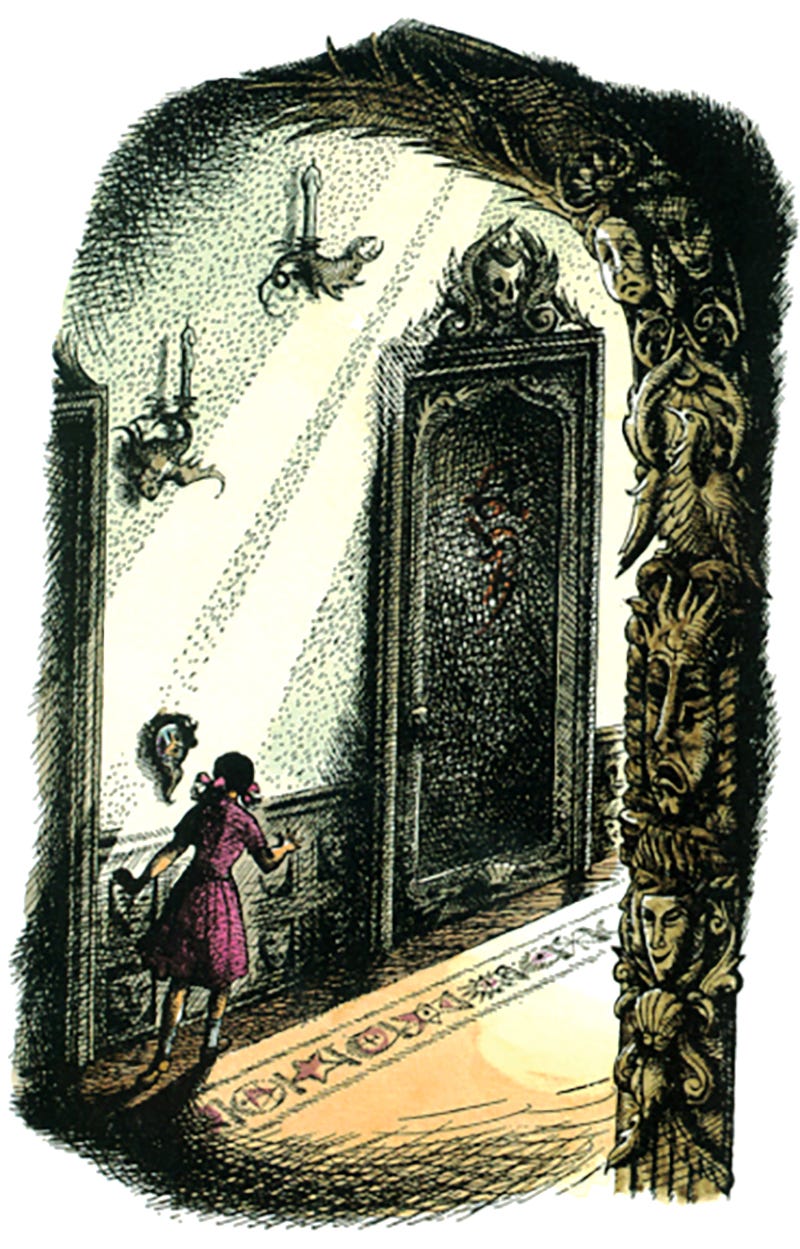The Voyage of the Dawn Treader: Chapter 10 “The Magician’s Book”
C.S. Lewis Read-Along, Vol. 3, Issue 11
Chapter 9 “The Magician’s Book”
Background: In both his public and private writing, C.S. Lewis frequently wrote about fears, something he was personally acquainted with. With Lucy, he gives us a character who is afraid but carries on anyway. She serves as a model for dealing with fear.
Foreground: In this chapter, Lucy also serves as an example of a flawed character who gives in to temptation. She barely resists one temptation before hurdling head-first into another bringing about lasting consequences. Nevertheless, there is grace to be found, and it starts with a story.
Quote: “Then her face lit up till, for a moment (but of course she didn’t know it), she looked almost as beautiful as that other Lucy in the picture, and she ran forward with a little cry of delight and with her arms stretched out. For what stood in the doorway was Aslan himself, The Lion, the highest of all High Kings.”
Join with others to gain full access to the Lewis read-along (including this one), the latest news on Lewis, Tolkien, and adaptations of their works, and the full archives, including The Lion, the Witch and the Wardrobe and Prince Caspian read-alongs.
Background: “The Magician’s Book”
In this chapter, Lucy serves as an example for two different readers. Some may read about Lucy overcoming her fears and imagine themselves facing what frightens them. Others can finally relate to Lucy as a flawed character who nonetheless finds grace after her mistakes.
C.S. Lewis wanted us to have both—a model for not being held hostage by hears and a reminder that failures don’t have to define us even when our mistakes have lasting consequences. In the following section, we’ll look more at flawed Lucy, but first let’s talk about her bravery.
This is not the first time, nor will it be the last, that someone from the Dawn Treader (or the entire crew) has confronted fear, but this is an especially helpful moment for younger readers. Lucy faces an unknown and frightening situation. Lewis doesn’t downplay that. In fact, he heightens the tension by extending her journey to find the magic book. He writes that she could hear the tick-tock-tick-tock of a grandfather clock until she moves beyond its sound. Both the repetitive sound of the clock and then its fading away evoke ominous feelings.1
In the end, there was nothing to fear, but that didn’t negate the temporary terror for Lucy of what could happen. Lewis recognized this fear of possible outcomes having fought in World War I and lived in England during Germany’s bombing in World War II. Due to how the second war ended, a new fear emerged—an atomic bomb.
In his essay, “Life in an Atomic Age,” reprinted in Present Concerns, Lewis argues that we should not let the fear of some unknown destruction govern our lives. Instead, we should continue to live.
If we are all going to be destroyed by an atomic bomb, let that bomb when it comes find us doing sensible and human things—praying, working, teaching, reading, listening to music, bathing the children, playing tennis, chatting to our friends over a pint and a game of darts—not huddled together like frightened sheep and thinking about bombs. They may break our bodies (a microbe can do that) but they need not dominate our minds.
In a 1956 letter, he told one American lady, “Remember one is given strength to bear what happens to one, but not the 100 and 1 different things that might happen.” In essence, if you are facing a fear, God has given you all you need to overcome it. You don’t need to worry about all the things that could possibly happen. If they do, God will give you what you need for those as well.
But in voicing this very British “stiff upper lip” sentiment, Lewis wasn’t dismissing fears or shaming those who feel afraid. He dealt with fears all his life. He was calling us to face our fears, resting in God’s goodness and His ability to understand through the Incarnation.
Keep reading with a 7-day free trial
Subscribe to The Wardrobe Door to keep reading this post and get 7 days of free access to the full post archives.






